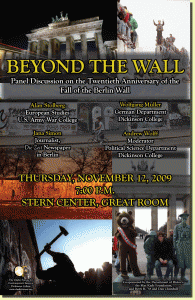Panel Discussion on the Twentieth Anniversary of the Fall of the Berlin Wall
Thursday, November 12, 2009
Stern Center, Great Room, 7:00 p.m.
When the Berlin Wall fell in 1989, the world watched and celebrated. After the jubilation subsided, questions and concerns arose as to the global and European political, social, and cultural consequences of this major event. A panel of three experts will discuss how this historical event transformed our view of Germany, Europe, and the world.
Panelists
Andrew Wolff, moderator, Political Science Department, Dickinson College
Jana Simon, journalist and writer, Die Zeit newspaper in Berlin
Wolfgang Muller, German Department, Dickinson College
Alan Stolberg, European Studies, U.S. Army War College
Co-sponsored by the Department of History, the Max Kade Foundation and Betty R. ’58 and Dan Churchill.
Topical Background
For nearly thirty years, the Berlin Wall symbolized the Cold War’s division of communist East Germany from democratic West Germany and the larger divide of Eastern from Western Europe. First erected in August of 1961 by the Soviet-occupied German Democratic Republic (GDR), the wall was built to prevent East Germans from immigrating to West Germany, which offered more economic freedom and personal independence. Over the years, the Wall evolved from an original wire fence to a complex series of concrete barriers and barbed wire with watchtowers, gun emplacements, and mines. The Wall ultimately extended 28 miles through Berlin and an additional 75 miles around West Berlin, thus separating it entirely from the rest of East Germany. Between 1961 and 1989, about 5,000 East Germans were able to cross the Wall and reach West Berlin safely, but another 5,000 were captured by East German authorities and 191 more were killed trying to escape.
As Communism crumbled in Poland, Hungary, and Czechoslovakia in the late 1980s, new departure points gave the East Germans the opportunity to flee to the West. This latest mass exodus, as well as the expulsion of its hard-line communist leadership in October of 1989, weakened the East German regime. On the night of November 9, the East German government announced that they were opening the country’s borders with West Germany. To Germany, Europe, and the rest of the world, the fall of the Berlin Wall signaled the end of the Cold War.
Harvard Economist Amartya Sen summarized the global effect of the fall of the Wall: “There is a lovely story in Sanskrit about a frog that is born in a well and stays in the well and lives its entire life in the well. Therefore, it has a worldview that consists of the well. That was what the world was like for many people on the planet before the fall of the wall. When it fell, it was like the frog in the well was suddenly able to communicate with frogs in all the other wells.”

